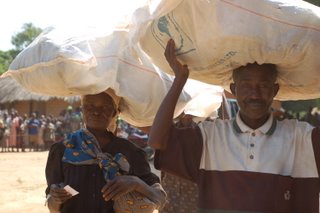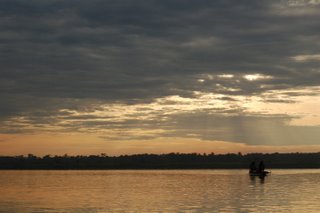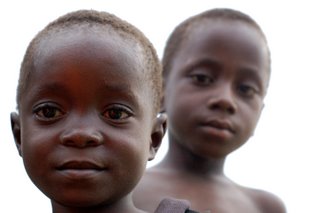At 11:20am yesterday I left the Congo. My blog title, as it stands, is no longer relevant. I am an ex-expat, an aidworker at large (i.e. among the unemployed). Why did I leave? Well, anyone who has been following along has seen this one coming, and not just because I announced it a couple of months ago. I was getting burnt out. Unlike the viewpoint of many an American rockstar, fading away is definitely preferable to burning out, so I am fading out of the Congo.
How do I feel? Confused, relieved. I am sitting in my friend’s house is Lesotho, drinking tea, curled up in her blankets, unwinding. This is going to take a while.
What I will miss:
The bush
The occasional helicopter ride
Riding motorcycles
Being a part of visible change
Street kids
Seeing the stars at night
Hanging with people from all over the world
My amazing friends
This blog
The beautiful tough craziness that is Congo
What I will not miss:
Wondering if I have malaria every time I get a headache
Boiling and filtering drinking water
Really bad roads
Street kids
Government authorities
Getting asked for money, jobs, clothing, and visas
Hot weather with no AC
Slllllooooooooooooowww internet
Congolese bureaucracy
I spent 16 months in the Democratic Republic of Congo – one year in Kindu and four months in various areas of the Katanga Province. Is has not always been easy, in fact, I would say that it was rarely easy. I was in a plane that ran off a runway in June 2005. In August 2005 I had to be evacuated from Kindu and hospitalized for seven days because I had a severe case of malaria. Being one of only a handful of white women in a rural town meant that I could never ever just be anonymous. But having faced these challenges, I could deal with anything, and I did. I liked that not blending in meant that kids knew my name and waved at me on the street. No running water or electricity? Bring it on. You have to make the best of it, roll with the punches, and remind yourself that everything you do is a choice (though man, that plane thing was bad luck).
In my first project I managed seed activities and household item distributions in a post-conflict area. My second one, in Katanga Province, was more intense. I led evaluations in areas recently affected by conflict and then managed the distribution of household kits for families who had fled because of army fighting and rebel attacks. In Katanga it is said that 200,000 people were displaced in 2005-2006. By the time I left we had assisted about 50,000 of them with other NGOs having helped most of the rest. This second post is paradoxically the best experience that I had in Congo and the one that led to my decision to leave. I pushed the envelope, upped the bar, and managed the delivery of assistance in very complicated circumstances. I also fully understood for a moment the destruction that conflict has caused. The wall I put between myself and the Congo came down.
And what did I see? How unnecessary the suffering is. It sounds like a given, but really, I had been protecting myself from it. Did I understand the war (or “wars” for that matter)? No. I will never understand them. I wrote my undergraduate thesis on the evolution of ethnic conflict in Eastern Congo, never expecting I would one day end up there. I have read most articles and several books on the Congo. But the more I know the less I understand, now that I have lived there. I hear of fearsome Mai-Mai rebels who have consumed human flesh and use magic to turn bullets to water – I did not anticipate that most of the Mai-Mai coming out of the bush would be malnourished women and children, families (and in some cases captives) of the fighters. Villages tell us that rebuilding their roads is a priority, and then someone steals three dollars worth of bags of sand temporarily holding up a bridge, causing it to collapse. I know that the fight for control of mineral wealth is a crucial fuel to conflict – I did not expect that the mining also provides crucial livelihood and economic diversity for small-scale exploitation in certain areas, that the mining companies are also providing hundreds of thousands of dollars for infrastructure and community projects. I know Mobutu gained one of the largest fortunes in the world while the country fell apart, and yet a nun colleague of mine tears up when she watches documentaries about him, explaining to me that he will always be the Congo’s father. We all want one supreme bad guy, the simple solution, the problem that can be solved. But that is not Congo. Congo is the product of decades of cruel plundering and colonialism by Belgium, being run into the ground by Mobutu, interventions and assassination by the CIA and Belgian armies, rivalries between groups amassing power and resources on ethnic lines, the fight for mineral riches, mercenaries, arbitrary boundaries, foreign rebel groups trying to take down the governments of neighboring countries, foreign and Congolese rebel groups trying to take down the Congolese government, secession attempts, and above all, the Rwandan genocide (which in turn is the product of hardening socio-economic and ethnic divisions through Belgian rule, land disputes, the political favoring of one ethnic group then another by Belgium, political exclusion…). It goes on. I don’t think that a government in the Congo has ever fully controlled its territory, which is one of the criteria by which a chunk of land is considered a nation-state. Yet this area the size of Western Europe manages to still be Congo.
The election is being hailed as the greatest chance for peace and warned as a catalyst for the imminent possibility of the increased conflict because certain people (namely former rebel-leaders and current Vice Presidents) are likely to lose power. These notions, while diametrically opposed, are both about change. The fact that either scenario can be expected sums up the fragility of peace and the dangers of democracy in a country that is still experiencing several different conflicts in Katanga, Kivus and Equator provinces (in the East), while the government is being run out of Kinshasa (in the West), by a current and probably future president (Kabila), whose power base in the western part of the country is fragile because he is viewed as an outsider (does not speak Lingala and grew up in Tanzania). It took most of the “developed” democratic countries decades of learning lessons the hard way, and our democratic governments have promoted slavery, segregation, apartheid, the oppression of women, have and continue to wage wars (hot and cold), violate internally accepted human rights standards, and a host of other problems that still need to be worked out. Democracy will also allow for local power struggles to play themselves out in parliamentary elections in Congo. Am I against democracy? Heck no. Let’s just keep in mind – there are no easy solutions.
I am not sure whether I will be continuing with this blog, creating another, or taking a break from the online diary world. Thanks to all who have posted comments and followed along with the adventures to date.
Best of luck to those expats who are sticking it out here in Congo – be you pilots, MONUC or your run-of-the-mill crazy humanitarians like myself.
For people who might be coming, here is some random advice for you.
The top ten most useful items for anyone coming to Congo:
Ipod or other music player
Electrical converter/universal power adapter
Anti-bacterial hand gel
Anti-malaria medication (this is not optional. Take it!)
Handwipes/moist toilettes (baby wipes work too)
Your favorite hairgel/conditioner/bath products
Flashlight (I like the headlamp kind)
Digital camera
Books
Sense of humor
Basic questions for anyone coming to Congo:
Do I need a visa?
Yes, and you must get it in advance if you are arriving in Kinshasa or Lubumbashi. I am not sure about crossing into DRC by road at Goma or Bukavu – you might be able to get buy a weeklong visa at the border. If you are visiting an organization working in the Congo you can get in with an invitation letter and acquire the visa upon arrival, but make sure that the organization knows how to get this done!
Do you need to pay entry taxes, customs taxes, airport taxes, fines to policemen, etc?
Nope. I never once did, but it’s not always easy. There are no entry taxes. Talk to your contact before coming to Congo to make sure that they have a protocol person to meet you at the airport if you are arriving in Kinshasa. If you send baggage unaccompanied you can expect customs to charge you a random overpriced amount and you’ll have to pay it. Always be friendly to soldiers, officials, police, etc. who ask you for money. Just explain that you cannot give them anything but maybe next time. If a soldier, policeman, or GSSP (special presidential guard) signals you to pull over or come to where they are, act like you don’t see them and keep moving, especially if it is a soldier or GSSP. If this is not possible, be friendly, try to avoid handing them any documents, and do not go anywhere with them. Try to avoid having your bags inspected. If an airport security or customs official insists on opening them, watch them closely to make sure they do not put anything in or take anything out.
Can I drink the water?
No. If you are not staying long buy bottled water. If you are staying for a while purchase a filter and either boil it for 10 minutes before filtering or add 1 drop of bleach per liter post filtering (my preferred method).
Is Congo safe?
Actually, most of Congo is quite safe. Kinshasa is far safer than Johannesburg and Nairobi, for example. The major cities (Kinshasa, Goma, Lubumbashi, Kisangani) have the same dangers as most African (and non-African) cities of their size. In Kinshasa do not walk at night or take public taxis (mini-buses). Keep your car doors locked. The most common danger is being mugged or having your bag snatched – violent crime is rare. Always stay away from any areas where protests are occurring and register with your embassy.
Can I “travel” in Congo?
Yes and no. Do not just go traveling through Congo without carefully mapping out where you are going and running your route by people who know these areas. Drop any notions of a cross-country trip and many notions of “exploring” Eastern Congo. I’ve heard of people taking buses out of Goma and heading north, then bragging about it. Not a good idea. There are a lot of security issues in the Kivu provinces, Katanga and Equator. When I was in Kindu the police arrested some guy who was motorcycling through Congo. That is a really dumb idea. If you want to visit Congo, make contact with people who live there. I would recommend hiking the volcano in Goma. I never did it, but apparently it’s amazing (you also have to hire armed guards and makes sure that the overall security situation is fine).
How does someone get around Congo?
By plane. Unless you are doing short trips out of Kinshasa, the roads system is pretty much non-existent in most of the country. You can take Hewa Bora and Wimbi Dira, but it will cost ya (a one-way ticket from Kinshasa to Lubumbashi can be as much as $300). CAA is a slightly cheaper option. DO NOT take any airlines outside of these three, because while their safety standards are not great, at least they have not crashed yet. If you are working with a non-profit, you can also travel on World Food Program and Airserv flights.
Is Congo cheap?
Not at all! I know, you think "middle of Africa" and you picture it to not be terribly expensive. But as anyone who's been to Central Africa knows, this isn't the case. Hotels and restaurants are quite expensive by many traveling standards. Expect to pay a mimimun of $50 a night in Kinshasa for a decent room. The prices are restaurants are on par with American and European prices, if not more expensive. Local restaurants are cheap if you'd like Congolese food, but if you haven't been in Congo for a while, be aware that your stomach might not agree with the experience.
Can I take photos?
Alright, you probably didn’t even ask yourself this one. Avoid taking photos in Kinshasa and other main towns. I am not sure if it is officially illegal, but the police will definitely give you a hard time and tell you that it is.







